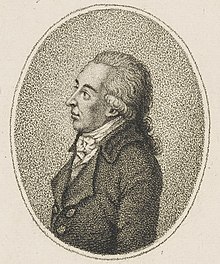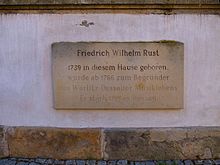Friedrich Wilhelm Rust

Friedrich Wilhelm Rust (born July 6, 1739 in Wörlitz / Dessau , † February 28, 1796 in Dessau) was a German violinist and composer . He was the father of the pianist and organist Wilhelm Karl Rust and the grandfather of the Thomaskantor , composer and Bach scholar Wilhelm Rust .
Life
Friedrich Wilhelm Rust received a thorough musical education at an early age, which was initially taken over by his father, a princely chamber councilor and bailiff, and after his death in 1751 Friedrich's eldest brother, Johann Ludwig Anton . Rust attended to 1758 the Lutheran High School in Köthen and studied law in Halle (Saale) , where he by Wilhelm Friedemann Bach in composition was taught organ and piano. From 1762 he took music lessons with Karl Hoeckh (1707–1773) in Zerbst and with Carl Philipp Emanuel Bach and Franz Benda in Berlin . In 1767 he accompanied Prince Leopold Friedrich Franz von Anhalt-Dessau on a trip to Italy, where he completed his training with Giuseppe Tartini and Gaetano Pugnani . From 1766 he worked again in Dessau, among other things as a teacher. From 1775 he was the successor to Johann Friedrich Fasch court music director and head of the theater in Dessau. Goethe , who was in Wörlitz in 1776, was so impressed by him that he wanted him to set most of his works to music.
During his musical training, Rust came into contact with the work of Johann Sebastian Bach at a young age . According to his own statements from the Well-Tempered Clavier he played "the first 24 preludes and fugues from all notes by old Sebastian Bach from beginning to end by heart." His large collection of Bach's works, consisting of handwritten copies, copies of other contemporaries as well composed of print, included more than 90 individual works, mainly for keyboard instruments (including Six Trio sonatas for organ , Four duets from the Clavierübung , well-Tempered Clavier part 1 ). After Rust's death, the collection initially remained in the family's possession. After the death of his grandson Wilhelm Rust, it was transferred to various "intermediate owners" and is now partly in the Johann Sebastian Bach Institute in Göttingen.
plant
In addition to occasional works, Rust composed cantatas ( Lord God we praise you , all gracious, in all heights ), odes and songs (including Wanderer's night song after Goethe) in a sensitive style as well as musical contributions to duo and monodrama , such as Inkle and Jaryko (Berlin 1777), Fingal in Lochlie , Inamorulla (after Ossian ) and Colma (all Dessau 1782); also the shepherd game Korylas and Lalage (around 1786). His technically demanding violin and piano works (including six sonatas ) can already be classified as classical.
Rust wrote mainly works for violin and piano (sonatas, concerts, fantasies), but turned increasingly to church music, especially in the last twelve years of his life.
- Sonata a Violoncello solo con Basso (ca.1775)
- Sonata in G major (first edition 2006)
- Serenade Quartet in C major
- Violin Sonata in C major
- 2 partitas for violin solo
- several works with viola d'amore
expenditure
- Second Sonata [B flat major] for solo violin by F. [riedrich] W. [ilhelm] Rust, edited by Edm. [And] Singer. Leipzig. CF Peters 1873; in Edition Peters No. 1472, numerous editions to date.
literature
- Wilhelm Hosäus: Rust, Friedrich Wilhelm . In: Allgemeine Deutsche Biographie (ADB). Volume 30, Duncker & Humblot, Leipzig 1890, pp. 20-24.
- Rudolf Czach: Friedrich Wilhelm Rust. Life and works. Diss. Julius Kauermann, Essen 1927.
- Erich Prieger: Friedrich Wilhelm Rust: A predecessor of Beethoven's (1894) (paperback) . Kessinger, 2009, ISBN 978-1-120-62306-5 .
Web links
- Sheet music and audio files by Friedrich Wilhelm Rust in the International Music Score Library Project
Individual evidence
- ^ Lutz Buchmann: Friedrich Wilhelm Rust (1739–1796). Investigations into his songwriting and his contribution to the transmission of the works of Johann Sebastian Bach. Halle, Univ., Diss. A, 1987, DNB 880915900 , p. 149.
| personal data | |
|---|---|
| SURNAME | Rust, Friedrich Wilhelm |
| BRIEF DESCRIPTION | German composer |
| DATE OF BIRTH | July 6, 1739 |
| PLACE OF BIRTH | Woerlitz |
| DATE OF DEATH | February 28, 1796 |
| Place of death | Dessau |


